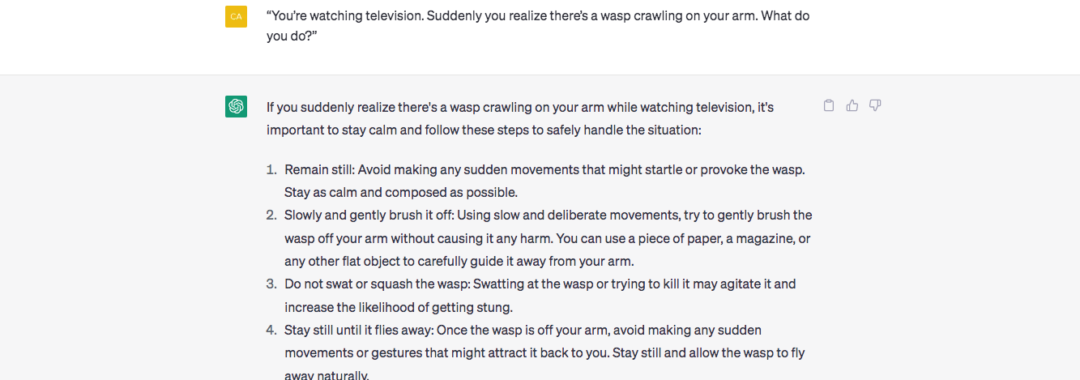The way we need to understand AI is constantly changing. ChatGPT has only just been released but continues to change. It wouldn't be prudent to jump into using generative AI without considering the implications of a newly released technology that is changing so rapidly.
Whether it is your company's marketing or other internal processes, there are a lot of implications to using generative AI tools. Here are some of the issues to consider.
Generative AI Uses Algorithms to Generate Text
Tools like ChatGPT may seem very human-like because the text produced comes from "learning and copying" the patterns of existing text scanned from a massive dataset of existing documentation. The text produced is free of errors and can even seem to be written by someone who is highly skilled. The reality is the text produced is not human and does not come from experience.
There have already been many cases where the outputs from generative AI tools are very incorrect and false despite being very convincing. Furthermore, if we delve a little deeper to understand the way text is produced, there is impetus to create falsehoods. This is particularly the case in marketing because the goal is to convince. Do you get this point? If the goal is to convince, there will be weight to make content produced convincing, and therefore, by simple reasoning, a drive for tools to produce information that is not true.

Many tools have already produced so much information that is not valid. As we can already see, just-released tools are putting up big notices on the potential for such instances to occur. This was not the case in the early days when ChatGPT was released in February of 2023 and is a perfect example of the changing environment that everyone needs to understand. Everyone thought the information they were getting from generative AI was real and true until startling cases of false information dissemination came to light.
Quality of Output and Low-Quality Output
Generating better responses requires users to sophisticate the way they prompt generative AI tools. Many offshoots of ChatGPT are providing pre-emptive prompting tools to help users navigate such issues. With simple and direct questions, you get what appears to be sophisticated responses, but is not always the case. The output from generative AI tools lack insights on information they produce. In the case of marketing, this is a big issue. If you are not giving your clients or website's visitors insights to the information you share with them, you are not really helping them.
It is people with experience that give insights. Again, despite the output from generative AI appearing to be very human, it is still algorithms that generate that output. But because that information appears human-like, it is often being overlooked by those who read it, both in terms of those who used tools to produce text and those who consume it believing that information was produced by a human. If you read something, don't you want to know where that came from? Your customers will be the same, especially if they have consumed information you have published that is incorrect.
Very (Overly?) Organized and Clear Logical Text
Generative AI produces text that is highly organized and appears very logical to humans. This reveals the difference between humans and machines. An excellent example of this is to input something that is very easy for humans to answer. An example can be taken from the scene in Blade Runner (the movie) where the question is asked what to do if you see a wasp on your arm while watching television.
ChatGPT gives a huge and long-winded response with steps on what to do where a human would simply say that they would brush it off immediately.
Keeping Your Company's Information Private
If we take a look at some of the biggest brands in the world, we can see how cautious some companies in the world have become. According to Bloomberg, Samsung has already banned the use of generative AI, namely ChatGPT, due to leaking of sensitive data.
Since the release of ChatGPT, not only have many users signed up for the website, but numerous other generative AI tools have come onto the market. Most of these are using the ChatGPT API (this means they are connected to ChatGPT and using it as the backbone of the services they provide).
As it is in many cases, users must sign up and agree to the terms of use, when trialing or using the features of a web-based tool. Terms and conditions of use documentation is rarely read by most people, if they could read it. Many employees have been using generative AI to assist with tasks and entering information for a response on their "prompts". All of this information has been saved and there have already been cases where user use-history information has been leaked. As we can see in the case of Samsung, the company's response has been rather swift.
It is a good idea to be aware if your people are using generative AI tools and create guidelines on use. At least ensure information associated with your company's information is not being used while using these tools. ChatGPT has made it possible to stop history data being recorded and created a process to remove previous prompts from the company's database -- which is already a considerable amount and another task for users who blindly pumped information into the tool previously.
There are many more implications that we cannot avoid and must be pre-emptively aware of if we are going to deploy technologies in the early days of their release. Many companies and individuals have already been caught out.
Professional Advice
As it stands, the best recommendation is to err on the side of caution. This is particularly the case in terms of SEO. There was a time when it was thought it was great to produce reels of content to boost ranking. Before that it was keyword stuffing. And before that, there were many blackhat SEO methods used to push up ranking. There are already marketers who are stating they can rank with a huge volume of content produced by generative AI. Google has stated that it does not penalize generative AI produced content, but its quality ranking factors do not change.
Understanding what Google has stated is very important. So, yes, content produced by generative AI is not automatically penalized. But does not mean that all content produced by generative AI is going to rank because it appears to be authoritative. And changes will come as all search engines adapt to the flood of content that is being published in the rush to adopt generative AI. The fact is that no company should be producing content simply try to rank. That does not make any sense. We all need to assist and provide helpful insights, as this article also does. This content has not been produced to rank on search engines. It has been produced to help you with your decision making because we understand the implications of SEO for search ranking compared to SEO for helping content to be better shared through search engines.
Producing content simply to rank on search engines does not make sense in the long run as the factors of ranking change. Sharing information that provides helpful professional insights is key. That being said, ChatGPT can still help you organize your thoughts and help you with tasks when marketing your business as long as you stay in control.
This content was produced by humans at Lynx Search Engine Marketing.
If you would like help with maintaining your website or with content marketing, get in touch with us.

